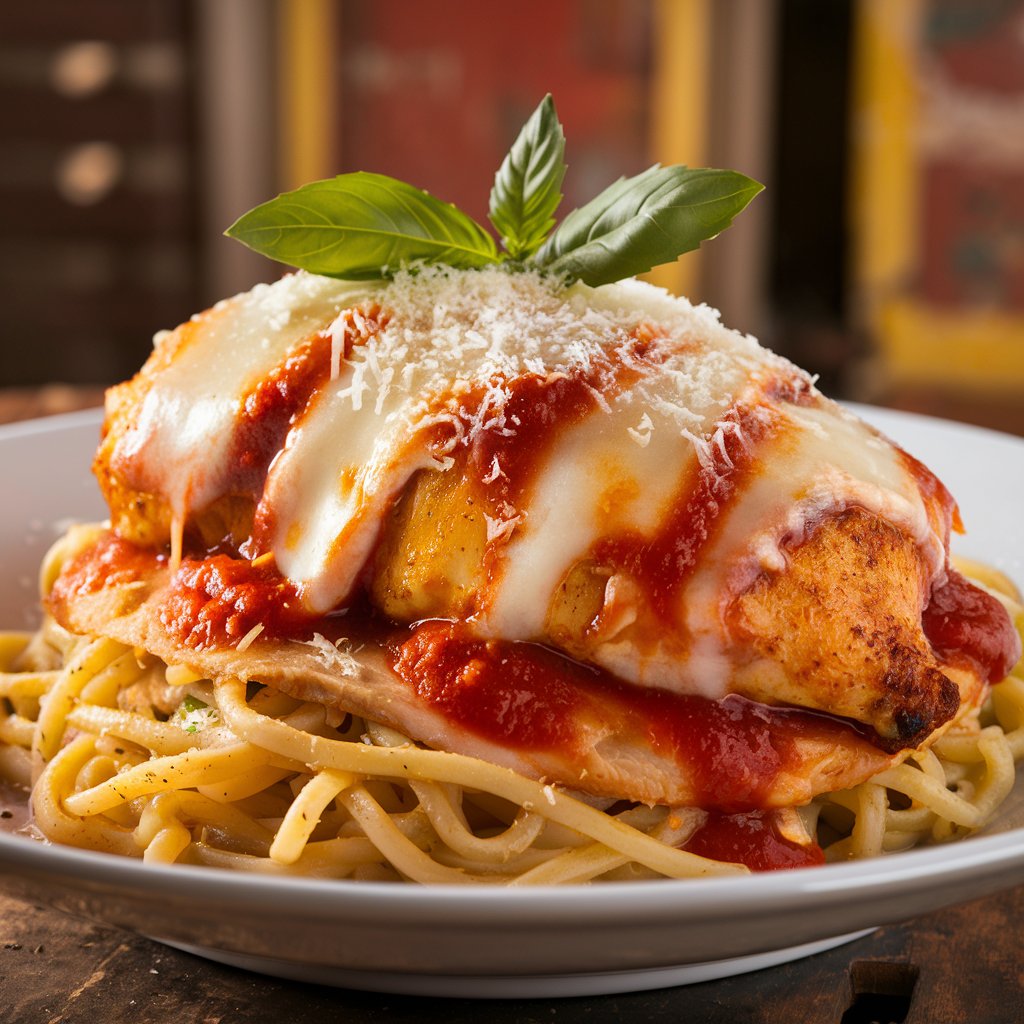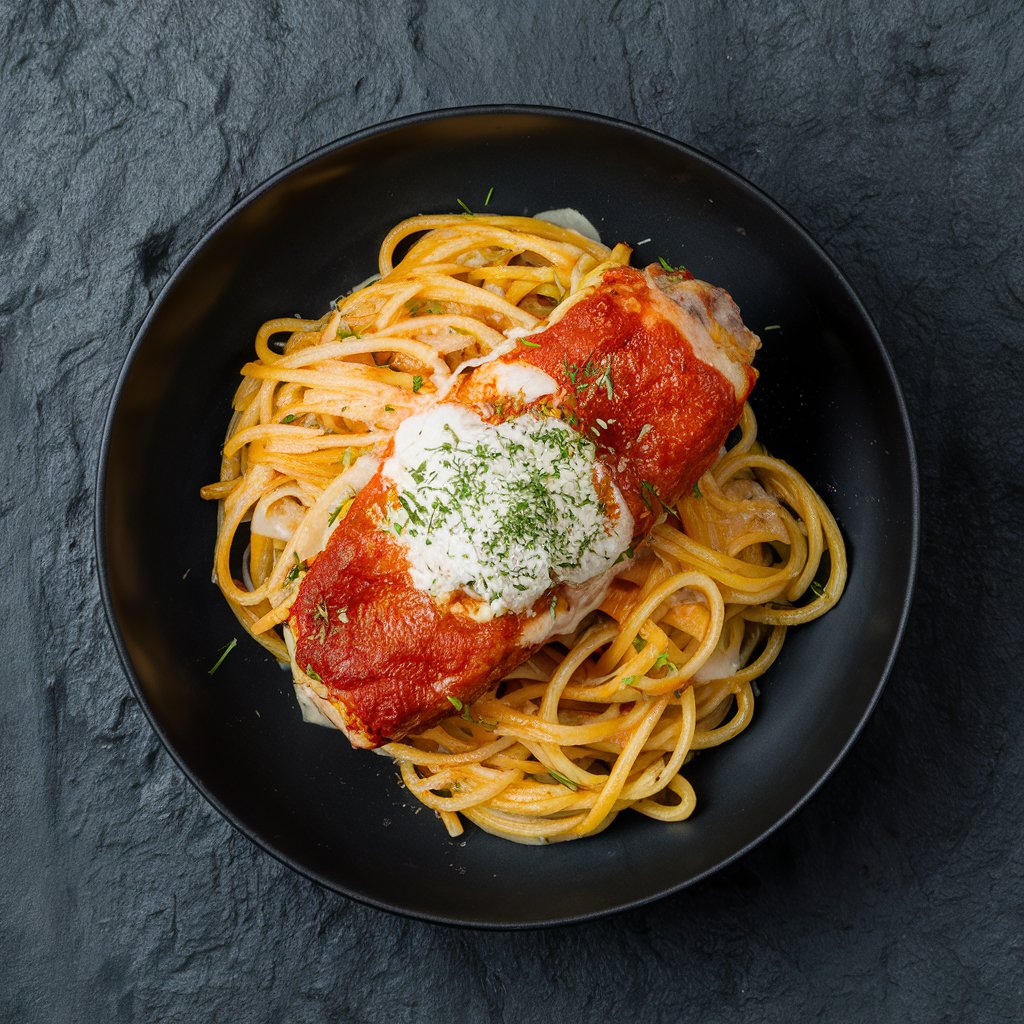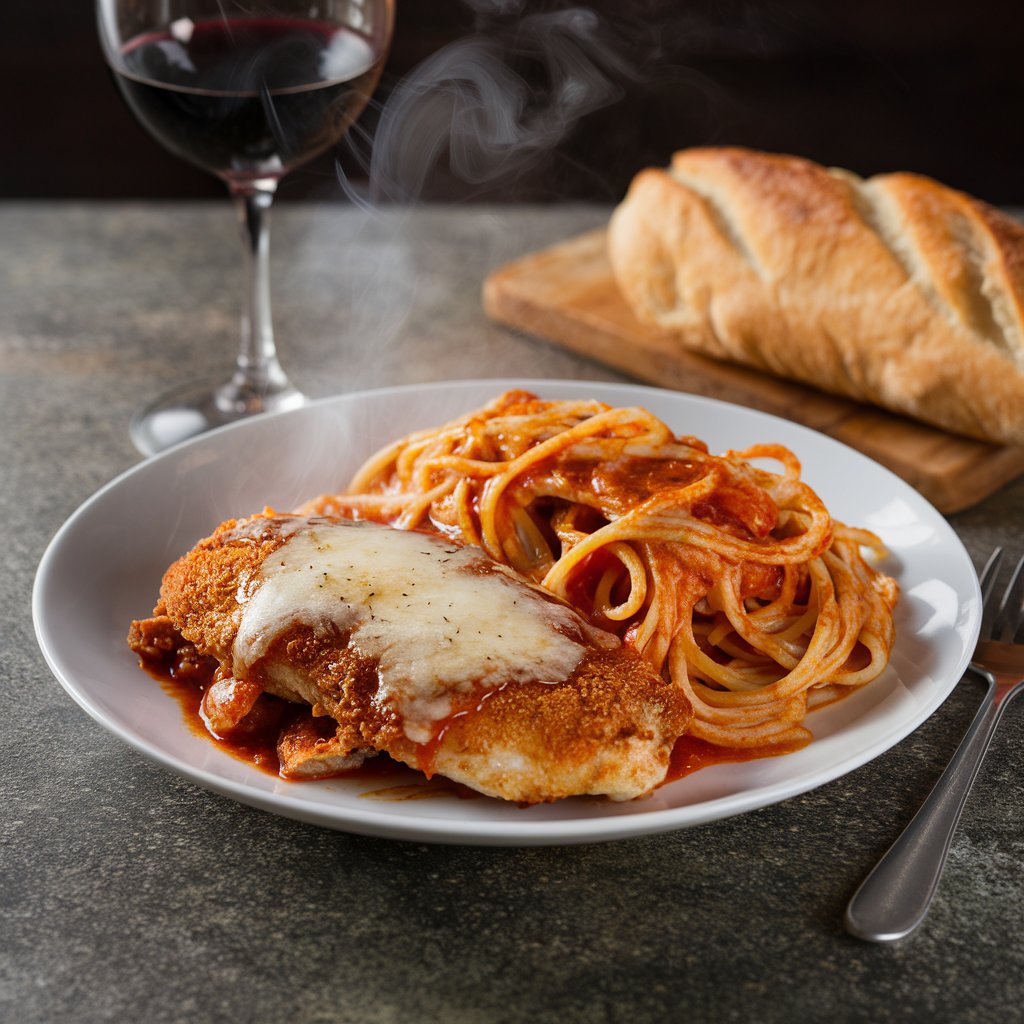Chicken parmesan, also known as chicken parmigiana or simply chicken parm, is a dish loved by many. Its crispy breaded chicken cutlet, covered in marinara sauce and topped with melted cheese, creates a flavor-packed combination that’s hard to resist. But when it comes to serving this savory delight, one common question arises: Does chicken parm always come with pasta?
In this blog post, we’ll explore the origins of chicken parmesan, its traditional accompaniments, and modern variations. We’ll uncover whether pasta is truly a must or simply a popular pairing, and what other sides work best with this iconic dish.
A Brief History of Chicken Parmesan
Chicken parmesan is rooted in Italian-American cuisine, but its origins can be traced back to Italy. The dish evolved from melanzane alla parmigiana, a southern Italian eggplant dish. Italian immigrants in the U.S. replaced eggplant with chicken, which was more readily available in their new home. This adaptation gave birth to the version of chicken parmigiana we know today.
While traditional Italian meals often emphasize the use of vegetables and lighter ingredients, the Italian-American adaptation of chicken parmesan is heartier. As it became popular in the U.S., it was commonly served alongside pasta. However, this pairing wasn’t originally a requirement but rather a cultural adaptation to meet American appetites for larger, more filling meals.
The Tradition of Pasta and Chicken Parm
In many Italian-American restaurants, chicken parm is served with a side of pasta, usually spaghetti. This combination became a signature pairing due to its simplicity and ability to complement the richness of the chicken and sauce. The pasta, usually served in a simple marinara or tomato-based sauce, provides balance by adding a starchy, mild flavor to the boldness of the chicken.
For years, this combination has been seen as the traditional way to enjoy chicken parmesan. It satisfies the craving for a full Italian-style meal, combining protein, carbs, and rich flavors all on one plate. Many restaurants continue to offer this pairing, with some even offering different pasta options like fettuccine, penne, or rigatoni.
Is Pasta Mandatory with Chicken Parm?
The question remains, though: Does chicken parm have to be served with pasta? The short answer is no. While pasta is a common and popular side, it’s not a strict requirement. In fact, many modern interpretations of the dish have moved away from this pairing, embracing different sides or even serving the chicken parm as a standalone entrée.
There are many factors to consider when choosing whether or not to serve pasta with chicken parm:
- Meal Balance: Chicken parm is already a hearty dish, with a fried cutlet, marinara sauce, and cheese. For those looking to avoid an overly filling meal, skipping the pasta might be the right choice.
- Calorie Conscious: Some may opt to cut down on carbs by skipping the pasta, serving the chicken with a lighter side like roasted vegetables or a simple salad.
- Culinary Creativity: Modern chefs and home cooks often explore different ways to serve chicken parmesan. By skipping the traditional pasta, they can get creative with sides that offer new textures and flavors, such as grilled zucchini, mashed potatoes, or even a light couscous salad.
Alternative Sides for Chicken Parm
While pasta remains a classic, many delicious side dishes pair well with chicken parm. Here are some alternatives to consider:
- Garlic Bread or Breadsticks
If you still want some carbs but prefer something lighter than pasta, garlic bread or breadsticks are perfect. They help to sop up any extra sauce without overwhelming the dish. - Steamed or Grilled Vegetables
Vegetables like broccoli, zucchini, and asparagus can provide a refreshing contrast to the richness of chicken parm. They add color, crunch, and nutritional value to the meal. - Salads
A crisp, fresh salad with a tangy vinaigrette can lighten the meal. Opt for a simple Caesar salad, mixed greens, or a refreshing Caprese salad with fresh tomatoes and basil. - Mashed Potatoes or Roasted Potatoes
Mashed or roasted potatoes can add another layer of comfort to the dish. These sides pair well with the flavors of chicken parm and provide a starchy component without being too heavy. - Polenta or Risotto
For those looking to stick to Italian roots without going the pasta route, creamy polenta or risotto can be a great match. These dishes add a luxurious texture and complement the sauce and cheese of chicken parm.  Internal Link to Side Dish Ideas:
Internal Link to Side Dish Ideas:- Sentence: Want more ideas on what to serve with chicken parmesan? Check out our article on Top 10 Side Dishes for Italian Meals for inspiration.
7. Internal Link to Gluten-Free Options:
- Sentence: If you’re looking for a gluten-free version of this dish, read our Gluten-Free Chicken Parmesan Recipe for an equally delicious alternative.
8. Internal Link to the History of Italian-American Cuisine:
- Sentence: Interested in the rich history of Italian-American dishes? Dive into our comprehensive guide on The Origins of Italian-American Cuisine.
9. Internal Link to a Homemade Marinara Sauce Recipe:
- Sentence: To make your chicken parmesan even more flavorful, try using our Homemade Marinara Sauce Recipe for a fresh and authentic taste.
10. Internal Link to Healthy Eating Tips:
- Sentence: For more tips on balancing flavor and nutrition, explore our Healthy Eating Guide for Italian Dishes to enjoy your favorite meals without the guilt.
11. Internal Link to a Comprehensive Guide on Pairing Italian Foods:
- Sentence: Curious about what beverages to serve with chicken parmesan? Visit our Guide to Pairing Wine with Italian Dishes for expert recommendations.
12. Internal Link to Family-Friendly Meals:
- Sentence: Chicken parmesan is a family favorite, and if you’re looking for more crowd-pleasers, don’t miss our Top 5 Family-Friendly Italian Recipes.
Healthy Variations of Chicken Parmesan
As dietary preferences change, so too has the way chicken parm is prepared. Health-conscious individuals have found ways to lighten this classic dish while maintaining its signature flavors.
- Baked Chicken Parm
Instead of frying the chicken cutlet, baking it offers a lighter, healthier option without losing its delicious crunch. By using whole wheat breadcrumbs or panko, the dish retains its texture while reducing calories and fat. - Grilled Chicken Parm
For an even lighter version, grilling the chicken instead of breading and frying it can make a huge difference. The charred, smoky flavor of the grilled chicken pairs beautifully with the tomato sauce and cheese. - Vegetarian Parm
Many have revisited the dish’s origins by opting for a vegetarian version, using eggplant, zucchini, or portobello mushrooms as the main component instead of chicken. This provides a lighter meal with the same rich flavors.
Pairing Chicken Parm with the Right Sauce
While marinara sauce is the traditional choice for chicken parm, some cooks prefer to experiment with different types of tomato sauces. Here are some variations:
- Arrabbiata Sauce: A spicy tomato sauce made with garlic and red chili flakes, perfect for adding a bit of heat to the dish.
- Tomato Basil Sauce: A fresher, lighter take with the sweetness of basil and a smoother texture.
- Puttanesca Sauce: A tangy, olive-infused sauce that offers a robust flavor and complexity to the dish.
Each sauce brings out a different aspect of the chicken parm’s flavor profile, allowing for even more variety in this classic dish.
Conclusion
So, does chicken parm always come with pasta? While it’s a traditional pairing, the answer is no – pasta is not a must. As chicken parm continues to evolve, people are exploring different sides and variations to fit their tastes and dietary needs. Whether you prefer the classic chicken parm with spaghetti or want to try it with roasted veggies or salad, the beauty of this dish is its versatility .



 Internal Link to Side Dish Ideas:
Internal Link to Side Dish Ideas: